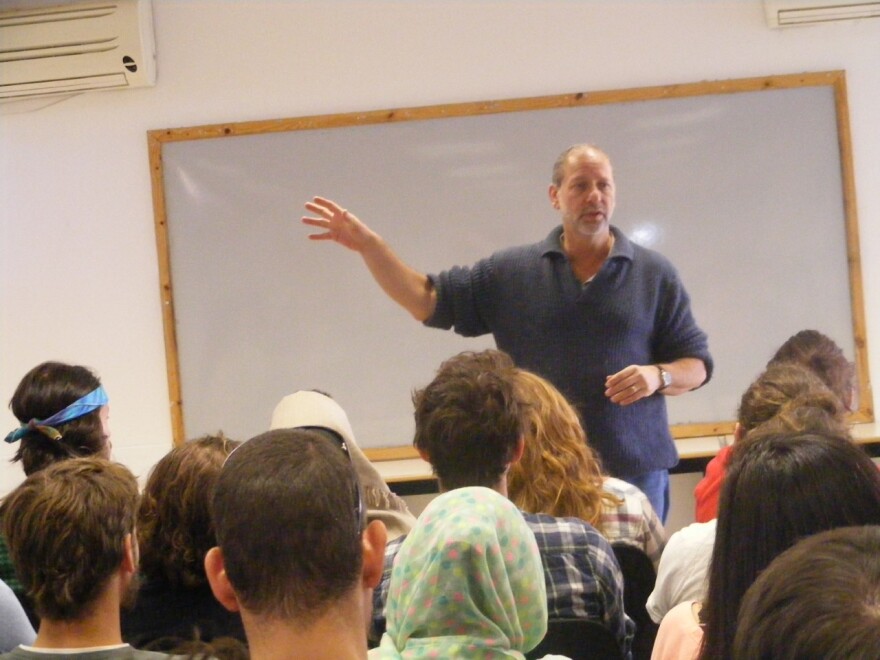The Arava Institute for Environmental Studies is grounded in its mission to save the natural world by bringing people together.
Students from Palestine, Jordan, and Israel were invited to work together on challenges around energy, food and water at the school located in the middle of the desert.
The institute's international development director and former executive director, Dr. David Lehrer, is in Milwaukee at Congregation Emanu-El B'ne Jeshurun this weekend sharing his ideas on how a shared environmental goal can improve relationships in the Middle East. The public is invited to attend.
The institute opened in southern Israel in 1996. Lehrer says faculty members quickly realized it wouldn't be as easy as putting students together in one room to figure out water issues and how to protect lizards.
“If we didn’t initiate the conversation then the conversation wouldn’t happen and that’s when we began to develop this peace-building leadership program,” Lehrer says.

Lehrer says when students first arrive, they’re often excited to meet people from other countries, but eventually Lehrer says the “honeymoon” dissolves.
“All of a sudden the Palestinian living with an Israeli, it dawns on him that Israeli once a year goes to army reserves and serves at check posts in the West Bank, and it occurs to the Israeli that this Palestinian comes from a family that is Holocaust deniers,” Lehrer says.
He says the school’s program gives students the tools to take on those difficult discussion. “It is the Middle East we’re talking about; these sessions aren’t very quiet and the often end with the students screaming and yelling at each other and stomping out the door but in the end they live together on the same campus sharing rooms, sharing tea, coffee,” Lehrer says.
And because they’re in the middle of a desert, it’s even harder to get away from one another. But Lehrer says the formula is working.

“We have over 1500 alumni around the world, two-thirds of them are in the Middle East. They maintain contact both with the institute and with each other,” Lehrer says.
Alumni have become teachers, some at the institute, others have become government leaders in the own communities.
“And so we’re really building through this a network of people who understand the importance of cross-border cooperation especially in order to deal with environmental issues and climate change,” Lehrer says.
He believes the peace-building model could help tackle other challenges in other parts of the world.

“That’s why the institute is looking to establish this Center for Applied Environmental Diplomacy, because we believe that what we are doing in the Middle East between Israelis, and Palestinians, and Jordanians, and now a wider group of other Arab countries can give us lessons for general conflict resolution,” Lehrer says.
He says most importantly people need to feel heard. "Especially those who perceive themselves as the victim. So learning to listen objectively in a way that allows people to say their piece and feel that someone heard them is critical,” Lehrer says.
He says listening fosters trust.
“Trust is the first step, that’s the most critical element. And the last lesson is it can’t all be about talk. Talk is nice, but in the end people want to feel that there’s some kind of improvement, some kind of impact for this collaboration,” Lehrer says.
Over the years he has watched people who would normally have thought of the other person in the room as their enemy. “I think that’s true of a lot of places in the world that by speaking to the enemy you in some ways betraying your cause, betraying your people,” Lehrer says.
Some people are brave enough to reach out, he says. “But in the end it can’t just be about dialogue otherwise you feel like you’re whitewashing or in our case greenwashing…there has to be some kind of impact that improves a situation,” Lehrer says.
He believe these lessons apply in multiple situations. “With the environment, we just have a very clear common interest with everyone on the planet,” Lehrer says.
Have an environmental question you'd like WUWM's Susan Bence to investigate? Submit below.
_






